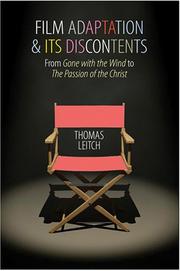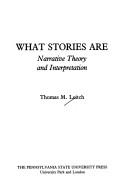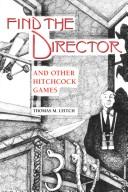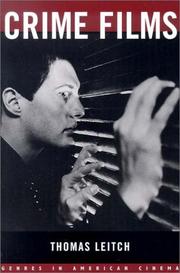| Listing 1 - 10 of 19 | << page >> |
Sort by
|

ISBN: 9780801885655 0801885655 9780801892714 0801892716 Year: 2007 Publisher: Baltimore, Md Johns Hopkins University Press
Abstract | Keywords | Export | Availability | Bookmark
 Loading...
Loading...Choose an application
- Reference Manager
- EndNote
- RefWorks (Direct export to RefWorks)
Most books on film adaptation -- the relation between films and their literary sources -- focus on a series of close one-to-one comparisons between specific films and canonical novels. This volume identifies and investigates a far wider array of problems posed by the process of adaptation. Beginning with an examination of why adaptation study has so often supported the institution of literature rather than fostering the practice of literacy, Thomas Leitch considers how the creators of short silent films attempted to give them the weight of literature, what sorts of fidelity are possible in an adaptation of sacred scripture, what it means for an adaptation to pose as an introduction to, rather than a transcription of, a literary classic, and why and how some films have sought impossibly close fidelity to their sources. After examining the surprisingly divergent fidelity claims made by three different kinds of canonical adaptations, Leitch's analysis moves beyond literary sources to consider why a small number of adapters have risen to the status of auteurs and how illustrated books, comic strips, video games, and true stories have been adapted to the screen. The range of films studied, from silent Shakespeare to Sherlock Holmes to The Lord of the Rings, is as broad as the problems that come under review.
Film adaptations --- History and criticism. --- Comparative literature --- Film --- 82:791.43 --- 82:791.43 Literatuur en film --- Literatuur en film --- Adaptations cinématographiques --- Histoire et critique --- History and criticism

ISBN: 0271004312 Year: 1986 Publisher: University Park, Pa Pennsylvania State University Press
Abstract | Keywords | Export | Availability | Bookmark
 Loading...
Loading...Choose an application
- Reference Manager
- EndNote
- RefWorks (Direct export to RefWorks)
Discourse analysis, Narrative --- Narration (Rhetoric) --- Narrative (Rhetoric) --- Narrative writing --- Rhetoric --- Narratees (Rhetoric) --- Narrative discourse analysis --- Literary rhetorics
Book
ISBN: 3031141539 3031141520 Year: 2023 Publisher: Cham : Springer International Publishing : Imprint: Palgrave Macmillan,
Abstract | Keywords | Export | Availability | Bookmark
 Loading...
Loading...Choose an application
- Reference Manager
- EndNote
- RefWorks (Direct export to RefWorks)
The thirteen essays in this volume seek to expose the scandals of adaptation. Some of them focus on specific adaptations that have been considered scandalous because they portray characters acting in ways that give scandal, because they are thought to betray the values enshrined in the texts they adapt, because their composition or reception raises scandalous possibilities those adapted texts had repressed, or because they challenge their audiences in ways those texts had never thought to do. Others consider more general questions arising from the notion that all adaptation is a scandalous practice that confronts audiences with provocative questions about bowdlerizing, ethics, censorship, contagion, screenwriting, and history. The collection offers a challenge to the continued marginalization of adaptations and adaptation studies and an invitation to change their position by embracing rather than downplaying their ability to scandalize the institutions they affront. Thomas Leitch is Unidel Andrew B. Kirkpatrick, Jr. Chair in Writing at the University of Delaware, USA, where he teaches undergraduate courses on film and graduate courses on literary and cultural theory. His most recent books are The Oxford Handbook of Adaptation Studies (2017) and The History of American Literature on Film (2021).
Adaptation (Literary, artistic, etc.). --- Adaptation Studies. --- Arts --- Inspiration --- Literature
Multi
ISBN: 9783031141539 9783031141522 9783031141546 9783031141553 Year: 2023 Publisher: Cham Springer International Publishing, Imprint: Palgrave Macmillan
Abstract | Keywords | Export | Availability | Bookmark
 Loading...
Loading...Choose an application
- Reference Manager
- EndNote
- RefWorks (Direct export to RefWorks)
The thirteen essays in this volume seek to expose the scandals of adaptation. Some of them focus on specific adaptations that have been considered scandalous because they portray characters acting in ways that give scandal, because they are thought to betray the values enshrined in the texts they adapt, because their composition or reception raises scandalous possibilities those adapted texts had repressed, or because they challenge their audiences in ways those texts had never thought to do. Others consider more general questions arising from the notion that all adaptation is a scandalous practice that confronts audiences with provocative questions about bowdlerizing, ethics, censorship, contagion, screenwriting, and history. The collection offers a challenge to the continued marginalization of adaptations and adaptation studies and an invitation to change their position by embracing rather than downplaying their ability to scandalize the institutions they affront. Thomas Leitch is Unidel Andrew B. Kirkpatrick, Jr. Chair in Writing at the University of Delaware, USA, where he teaches undergraduate courses on film and graduate courses on literary and cultural theory. His most recent books are The Oxford Handbook of Adaptation Studies (2017) and The History of American Literature on Film (2021).
Art --- literaire adaptatie --- kunst

ISBN: 0820313416 Year: 1991 Publisher: Athens, Ga University of Georgia Press
Abstract | Keywords | Export | Availability | Bookmark
 Loading...
Loading...Choose an application
- Reference Manager
- EndNote
- RefWorks (Direct export to RefWorks)
Book
ISBN: 9781405185387 Year: 2011 Publisher: Malden, Mass. Wiley-Blackwell
Abstract | Keywords | Export | Availability | Bookmark
 Loading...
Loading...Choose an application
- Reference Manager
- EndNote
- RefWorks (Direct export to RefWorks)
"Alfred Hitchcock remains the quintessential cinematic auteur - the director as hero. Fifty years of debate over his status as an obsessive and dictatorial artist has raised increasingly pressing questions about the relation between individual authorship, on the one hand, and contexts, influences, and collaborators, on the other. A Companion to Alfred Hitchcock authoritatively maps the body of work generated in response to the director and his films, compiling essays from some of the world's most noted scholars in the emerging field of Hitchcock studies"--
Book
ISBN: 9780199331000 9780199331017 0199331006 9780197509562 0197509568 Year: 2017 Publisher: New York: Oxford university press,
Abstract | Keywords | Export | Availability | Bookmark
 Loading...
Loading...Choose an application
- Reference Manager
- EndNote
- RefWorks (Direct export to RefWorks)
This collection of forty new essays, written by the leading scholars in adaptation studies and distinguished contributors from outside the field, is the most comprehensive volume on adaptation ever published. Written to appeal alike to specialists in adaptation, scholars in allied fields, and general readers, it hearkens back to the foundations of adaptation studies a century and more ago, surveys its ferment of activity over the past twenty years, and looks forward to the future. It considers the very different problems in adapting the classics, from the Bible to Frankenstein to Philip Roth, and the commons, from online mashups and remixes to adult movies. It surveys a dizzying range of adaptations around the world, from Latin American telenovelas to Czech cinema, from Hong Kong comics to Classics Illustrated, from Bollywood to zombies, and explores the ways media as different as radio, opera, popular song, and videogames have handled adaptation. Going still further, it examines the relations between adaptation and such intertextual practices as translation, illustration, prequels, sequels, remakes, intermediality, and transmediality. The volume's contributors consider the similarities and differences between adaptation and history, adaptation and performance, adaptation and revision, and textual and biological adaptation, casting an appreciative but critical eye on the theory and practice of adaptation scholars?and, occasionally, each other. The Oxford Handbook of Adaptation Studies offers specific suggestions for how to read, teach, create, and write about adaptations in order to prepare for a world in which adaptation, already ubiquitous, is likely to become ever more important
Literature --- Film adaptations --- Intertextuality --- Adaptations --- History and criticism --- Intertextuality. --- Adaptations cinématographiques --- Intertextualité --- History and criticism. --- Histoire et critique --- Littérature --- Littérature --- Adaptations cinématographiques --- Intertextualité --- Film --- Audiovisual translation --- Literary semiotics --- Comparative literature --- Literature - Adaptations - History and criticism --- Film adaptations - History and criticism --- #SBIB:309H515 --- Literatuurwetenschap, literatuursociologie

ISBN: 0521646715 Year: 2002 Volume: *1 Publisher: Cambridge [etc.] Cambridge University Press
Abstract | Keywords | Export | Availability | Bookmark
 Loading...
Loading...Choose an application
- Reference Manager
- EndNote
- RefWorks (Direct export to RefWorks)
Basic Instinct (Film) --- Basic Instinct (Motion picture) --- Blue Velvet (Cinéma) --- Blue Velvet (Film) --- Blue Velvet (Motion picture) --- Bullitt (Film) --- Bullitt (Motion picture) --- Chinatown (Film) --- Chinatown (Motion picture) --- Crime de l'Orient Express, Le (Film) --- Double Indemnity (Film) --- Double Indemnity (Motion picture) --- Fargo (Film) --- Fargo (Motion picture) --- Fury (Film) --- Fury (Motion picture) --- Godfather, The (Film) --- Godfather, The (Motion pictures) --- Murder on the Orient Express (Film) --- Murder on the Orient Express (Motion picture) --- Parrain, Le (Film) --- Reversal of Fortune (Film) --- Reversal of Fortune (Motion picture) --- Detective and mystery films --- Gangster films --- Police films --- Films de détective --- Films de gangsters --- Films policiers --- History and criticism --- Histoire et critique --- United States

ISBN: 1107128064 0511040288 0511148534 0511556187 0511606451 0511051514 9780511040283 9780511606458 9780511051517 0511036280 9780511036286 9780511148538 9786612389283 6612389281 9780511643118 051164311X 0521641063 0521646715 9780521641067 9780521646710 9780511556180 9781107128064 Year: 2002 Publisher: Cambridge ; New York : Cambridge University Press,
Abstract | Keywords | Export | Availability | Bookmark
 Loading...
Loading...Choose an application
- Reference Manager
- EndNote
- RefWorks (Direct export to RefWorks)
This book surveys the entire range of crime films, including important subgenres such as the gangster film, the private eye film, film noir, as well as the victim film, the erotic thriller, and the crime comedy. Focusing on ten films that span the range of the twentieth century, Thomas Leitch traces the transformation of the three leading figures that are common to all crime films: the criminal, the victim and the avenger. Analyzing how each of the subgenres establishes oppositions among its ritual antagonists, he shows how the distinctions among them become blurred throughout the course of the century. This blurring, Leitch maintains, reflects and fosters a deep social ambivalence towards crime and criminals, while the criminal, victim and avenger characters effectively map the shifting relations between subgenres, such as the erotic thriller and the police film, within the larger genre of crime film that informs them all.
Detective and mystery films --- Gangster films --- Police films --- Cop films --- Crime films --- Bandit gangster films --- Gang films --- Gangland films --- Hoodlum drama (Motion pictures) --- Mafia films --- Organized crime films --- Outlaw-couple films --- Outlaw gangster films --- Rural bandit films --- Syndicate films --- Syndicate-oriented films --- History and criticism. --- Criminal films --- Motion pictures --- Caper films --- Thrillers (Motion pictures)

ISBN: 0801891876 143569256X 9780801891878 9781435692565 9780801885655 0801885655 0801892716 9780801892714 Year: 2007 Publisher: Baltimore, Md. Johns Hopkins Univ. Press
Abstract | Keywords | Export | Availability | Bookmark
 Loading...
Loading...Choose an application
- Reference Manager
- EndNote
- RefWorks (Direct export to RefWorks)
The range of films studied, from silent Shakespeare to Sherlock Holmes to The Lord of the Rings, is as broad as the problems that come under review.
| Listing 1 - 10 of 19 | << page >> |
Sort by
|

 Search
Search Feedback
Feedback About UniCat
About UniCat  Help
Help News
News